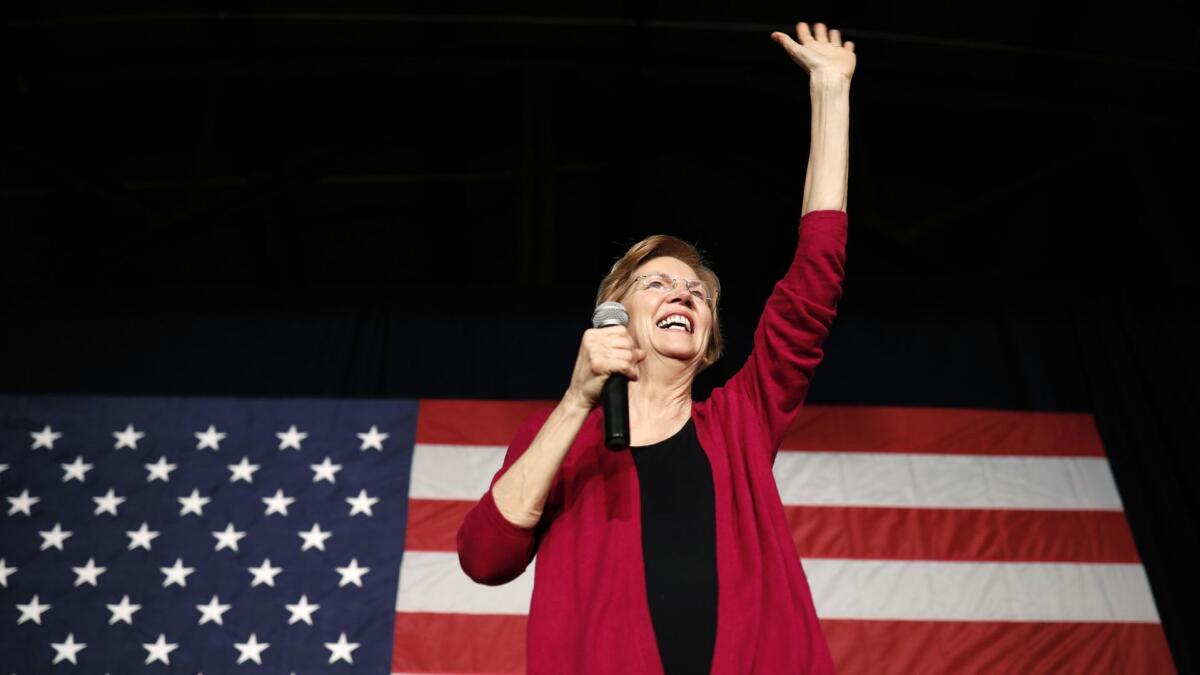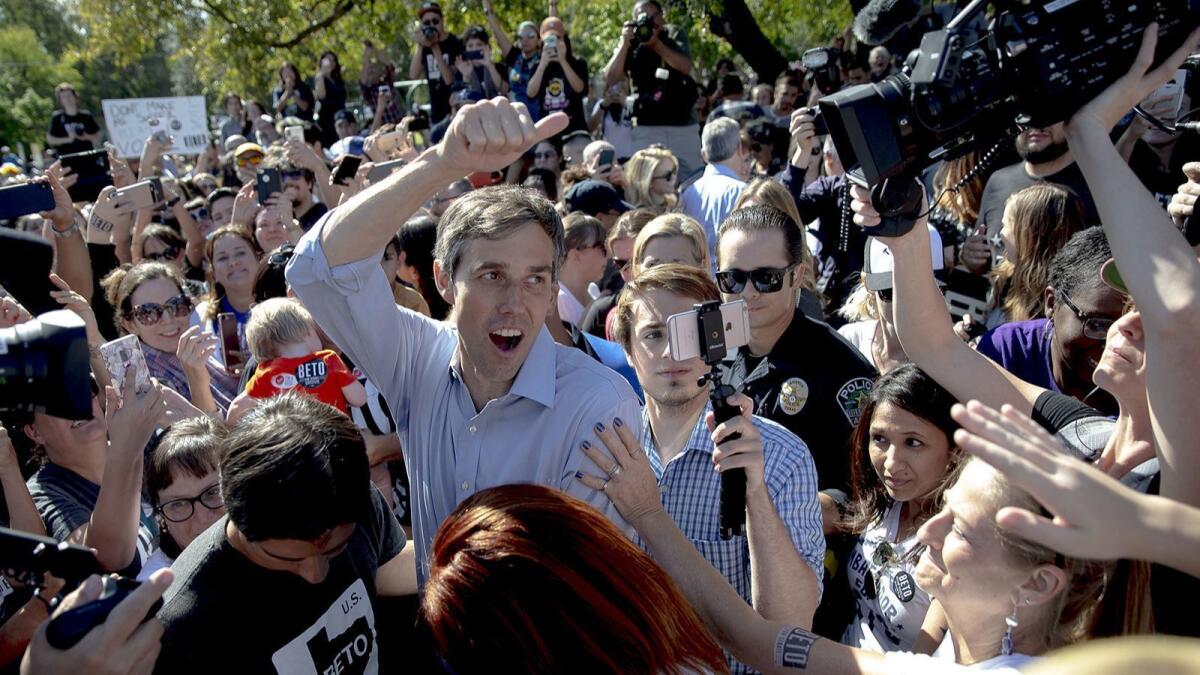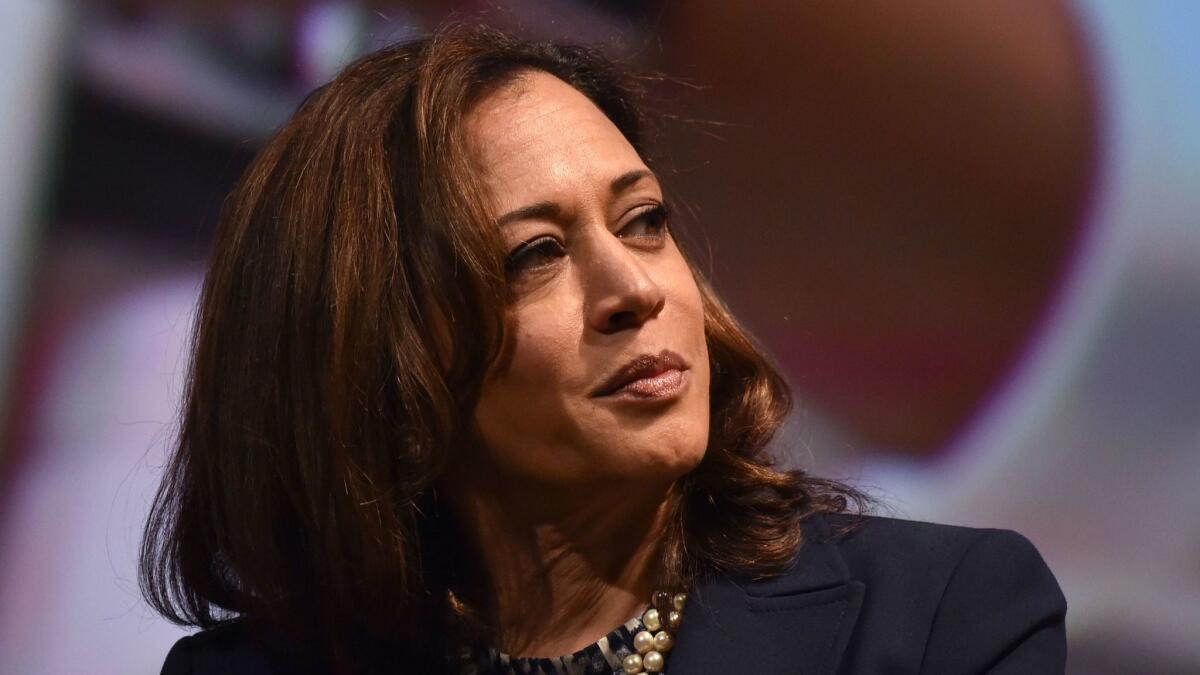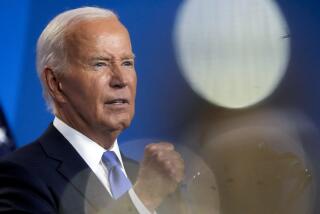Old, young, liberal, centrist: Democrats will have no end of choices for president in 2020

- Share via
Reporting from Washington — There are fresh faces and old hands. Thirty-somethings and senior citizens. Billionaires and at least one person still paying off student loans. A skateboarder, a brewery founder and a coffee magnate are all taking a look.
Dozens of Democrats are thinking about running for president in 2020.
The result could be a divisive, messy set of primaries, but many Democrats are exhilarated by the prospect of a wide range of choices, mirroring the congressional races in 2018.
“If there’s one thing we learned over the last two years, it’s that primaries are a good thing,” said Amanda Litman, founder of Run for Something, a group established after President Trump’s election in 2016 to recruit and train young progressives to run for office. “They make our party stronger.’’
In sorting through their choices between young and old, liberal and more centrist, white men and women and people of color, Democrats will be deciding not only who they want as a nominee, but what kind of party they want to be now that the Clintons’ quarter-century political dynasty is essentially over.
With Trump as target, Democrats’ 2020 presidential field may be the biggest ever »
The earliest candidates to announce underscored the unparalleled diversity of the emerging field. A woman, Sen. Elizabeth Warren of Massachusetts, was the first major national figure to set up an exploratory committee. A Latino, former San Antonio Mayor Julian Castro, formally announced Saturday. A black woman, Sen. Kamala Harris of California, is on a book tour that will likely be followed by an announcement later this month.
But three white men’s decisions about whether to run could have outsized impact on the 2020 field: Former Vice President Joe Biden, Sen. Bernie Sanders of Vermont and former Rep. Beto O’Rourke of Texas all have the rest of the field watching for their decisions.
If Biden runs, he becomes an instant front-runner on the strength of his experience and vast political network. His entry would also guarantee that a central question of the primary will be a generational one, as younger rivals will argue that it is time for the older guard to pass the baton.

That generational split will widen further if the 46-year-old O’Rourke jumps in. He became a national sensation in his failed 2018 Texas Senate campaign, with viral Facebook livestreams of him skateboarding, driving and cooking dinner.
O’Rourke is not the youngest hopeful: California Rep. Eric Swalwell (D-Dublin), one of the youngest at 38, still owes about $100,000 on his student loans.
If Sanders decides to run, his will be a big presence in the lane of left-leaning candidates, one that would likely crowd ideological allies such as Rep. Tulsi Gabbard of Hawaii, who announced her candidacy Friday, and Oregon Sen Jeff Merkley if he runs.
With about three dozen Democrats either in the race or saying they are considering it, 2020’s Democratic primary field could rival the GOP’s sprawling 17-candidate field in 2016. It could break the Democratic record set in 1976, when 13 candidates ran serious bids for the nomination, according to Larry Sabato, director of the University of Virginia’s Center for Politics, who sees some parallels to today’s situation.
Democrats that year were riding high after their 1974 post-Watergate landslide, and the power of party bosses had been weakened.
“With no one influential enough to say ‘no,’ anyone with presidential ambitions said ‘yes,’” said Sabato. Now, the role in the nominating process for party leaders and so-called superdelegates has been diluted, and ambitious Democrats have been emboldened by their success in the 2018 midterm elections.
The huge and varied field of potential candidates cries out for a guide for keeping track of the herd.
The older generation
Biden, 76, and Sanders, 77, ride atop many polls — thanks largely to name recognition — and already have strong national political organizations in place. One obstacle they face, however, will be the clamor from some Democrats for a changing of the generational guard after a midterm election that reinforced the importance of young people to the Democratic Party coalition. According to exit polls, 67% of 18-to-29-year-olds voted for Democrats in House races in 2018.
“We are in the process of turning our party over to the next generation,” said Howard Dean, the former Democratic National Committee chair who ran for president in 2004. “I want a candidate under 50 or 55.”
Dean did not name names, but about half the people who are or are considering running — including Warren, 69 — are over 55.
Still, older candidates can appeal to younger voters, as Sanders showed during the 2016 campaign. In an August 2017 Wall Street Journal/NBC News poll, Sanders’ ratings among voters ages 18 to 34 were 53% positive and 22% negative. Biden’s ratings in a January 2018 poll were 46% positive and 21% negative.
Biden’s supporters say his age is less important than his experience as a lifelong public servant at the highest levels of government — 36 years as U.S. senator and eight as vice president — and see him as the best equipped to go toe-to-toe with Trump.
“I think I’m the most qualified person in the country to be president,” Biden said in a December speech in Montana.
But he is also going to have to show he is in step with a changing America.
“Any candidate who is going to win a Democratic primary needs to engage young people and women, African American women in particular,’’ said Amanda Litman. “It’s hard for me to imagine many of the older white men being able to engage those groups.”
Women
Warren and Gabbard are the first to step into what could be a crowded lane of women candidates, including Sens. Harris, Kirsten Gillibrand of New York and Amy Klobuchar of Minnesota.
Coming on the heels of the 2018 midterms, when a record number of women ran for office and were elected to Congress, women’s advocates hope 2020 could see another election with a woman at the top of the ticket.
But some Democrats are gun-shy about a female candidate after Hillary Clinton failed in her bid to become the first woman in the White House. Some worry about the sexism that lingers in the political arena.

“There are some voters who are reluctant to vote for a woman for president,” said John Grennan, co-chairman of Iowa’s Poweshiek County Democratic Party. “It was not specific to Hillary Clinton. That still could be a factor.”
Both Harris and Klobuchar have backgrounds in law enforcement, a less traditional career path for women. Gillibrand has the profile most closely associated with women’s issues, as a vocal ally of the #MeToo movement. Although many women praised her for her role in forcing Sen. Al Franken (D-Minn.) to resign over sexual misbehavior, other Democrats hold against her what they consider a rush to judgment.
People of color
A decade after the country elected its first black president, Democrats will probably have more than one candidate of color to consider. In addition to Castro, two black senators, Harris and Cory Booker of New Jersey, are almost certain to jump into the race. Also weighing a bid is Eric H. Holder Jr., who was the nation’s first black U.S. attorney general, under Obama.
In a recent interview on “The View,” Harris said she feels the United States is “absolutely” ready for a woman of color to be president.
Glynda Carr, cofounder of Higher Heights — a group that promotes black women in politics — said that some Democratic hopefuls have already reached out to the group in a hat tip to the importance of black women as both voters and candidates.
Although it’s no slam dunk that a person of color will top the ticket, Carr said: “I cannot imagine that the president and vice presidential nominee will both be white men.”
Governors
A passel of former and sitting governors are considering running — including Washington’s Jay Inslee, Montana’s Steve Bullock, Virginia’s Terry McAuliffe and Colorado’s John Hickenlooper (who also was a founder of a brewery before being elected).
None have yet caught fire, despite long-standing traditional wisdom that governors make stronger presidential candidates than senators because they have executive experience. Over the last 50 years, four governors, but only one senator — Obama — were elected to the White House.
But the current Trump-centric political climate has made it harder for governors to get attention for their home-state accomplishments. Democratic senators have had an easier time grabbing the spotlight by opposing the Trump presidency.
Also in the “we get stuff done” lane are three mayors and former mayors considering a bid — Eric Garcetti of Los Angeles, Mitch Landrieu of New Orleans and Pete Buttigieg of South Bend, Ind.
2020 candidates: Who’s in and who’s on the fence? »
Being an executive carries risks, as well, though, as Garcetti has found as he tries to schedule a presidential announcement around a teachers’ strike in the nation’s second-largest school district.
Tad Devine, a Democratic strategist who worked on the presidential campaigns of Al Gore in 2000, John Kerry in 2004 and Sanders in 2016, said that Democratic primary voters may be looking less for governing experience this time around than for inspiration and evidence that a candidate can beat Trump.
“The old stuff is going by the wayside,” said Devine. “The experience stuff — while important, and Biden will dwell on it — I don’t think it’s nearly as relevant as whether you have ideas that can excite people, whether you yourself can excite people.”
Billionaires
Media billionaire Michael R. Bloomberg, who invested heavily in Democratic candidates in the midterm election, is considering a presidential bid, as is former Starbucks Chief Executive Howard Schultz. Both have the advantage of boundless personal resources and status as political outsiders.
But super-wealthy business people don’t fit easily into a party dominated by liberals in a populist mood. In her inaugural swing through Iowa, Warren derided billionaire candidates.
One such hopeful, Tom Steyer, the former hedge fund manager from San Francisco, has already ruled out a presidential bid.
Twitter: @hookjan
More to Read
Get the L.A. Times Politics newsletter
Deeply reported insights into legislation, politics and policy from Sacramento, Washington and beyond. In your inbox three times per week.
You may occasionally receive promotional content from the Los Angeles Times.











